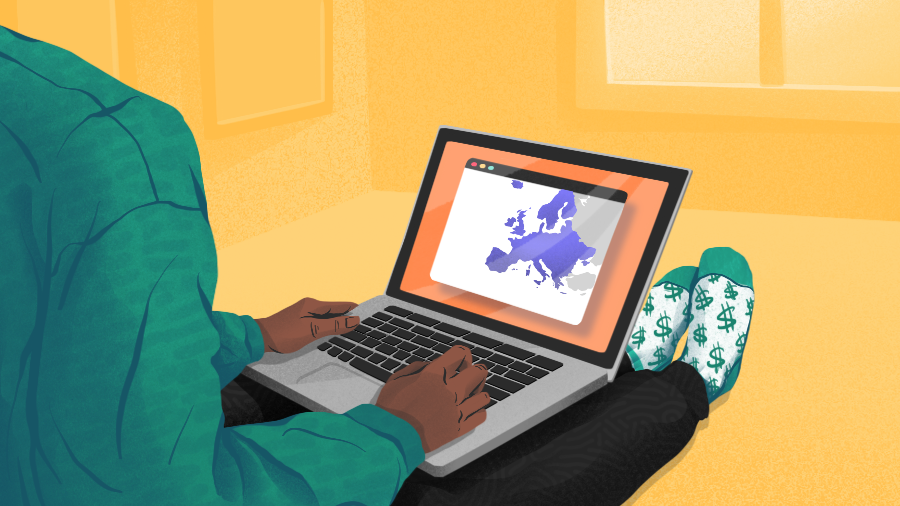The European venture ecosystem is robust and growing with strengths in fintech, health care, deep tech, data and analytics, and commerce and shopping.
Subscribe to the Crunchbase Daily
In the last 10 years, European venture has experienced growth year over year at between 16 percent and 55 percent–bar one year (2016) that was down 13 percent. (2014 and 2015 each experienced growth above 50 percent year over year.)
Fast-forward to 2020: Overall European venture funding is down 17 percent for the first three quarters of 2020 compared with the peak funding year of 2019, according to Crunchbase Data.
Read our Q3 2020 funding reports for the globe here and North America here
However, this third quarter captured the highest funding since Q3 2019, with a particularly strong funding month in September 2020, the second-highest funding month in the last two years. Funding tracks at $10 billion in Q3 2020, up 21 percent quarter over quarter but down 12 percent year over year.
And as we note in this report, investors are raising ever larger funds, along with more companies raising rounds above $100 million.
Overall, European venture peaked in 2019, contrasting with the U.S., which peaked in 2018. Funding to European-headquartered startups is around a third of U.S. funding. However, with some leading European startups moving to the U.S., but retaining their initial offices in Europe, the funding impact is larger than the following investment charts indicate.

Large fundings
In Q3 2020, there were 20 European companies that raised rounds above $100 million, the highest count of companies in that range within a single quarter over the last two years. These companies are headquartered across Europe from seven different countries including Sweden, Germany, United Kingdom, France, Finland, Netherlands and Turkey, which are listed below in order of the most funding raised.

Notable companies include payments company Klarna from Sweden, cloud kitchen service Karma Kitchen, and security analysis platform Snyk, both from the U.K., Auxmoney, a peer-to-peer loan marketplace, and vertical farming company Infarm, both headquartered in Germany.
Funding rounds over $100 million represent 45 percent of venture capital this quarter, higher than the second quarter at 27 percent and Q3 2019 at 39 percent.
Five new European companies joined the unicorn leaderboard this quarter including ecommerce marketplace enabler Mirakl (France), fitness apparel-maker Gymshark (U.K.), customer-engagement platform Infobip (U.K.), payments platform Mollie (Netherlands), and nutrition company Oatly (Sweden), bringing the total to 71 private European unicorn companies.
Leading countries
The leading countries for investments are the United Kingdom, Germany, France and Sweden. For France and Sweden, funding in 2020 for the first three quarters of the year is slightly above 2019 funding levels. For the first three quarters of 2020, the U.K. and Germany are down 21 percent and 19 percent, respectively, compared with 2019.

Funding by stage
Seed-stage funding is down both quarter over quarter and year over year, but seed funding also shows the highest data lags with the majority of smaller seed fundings added after the end of a quarter.

Early-stage venture was at $4.1 billion in Q3, up 33 percent quarter over quarter and 1 percent year over year. We attribute some of this increase quarter over quarter in part to large fundings above $100 million at the Series A and B stages.

Late stage–which includes Series C and later rounds as well as private equity–in venture-backed companies comes in at $5.2 billion, up quarter over quarter by 19 percent, but down year over year by the same percentage.

Active investors
Despite the pandemic, European venture firms are raising ever-larger funds in 2020. Earlier this year, Atomico from London raised its fifth and largest fund of $820 million. This past quarter, London-based Dawn Capital raised its fourth and largest fund to date at $400 million to back enterprise software startups. Point Nine Capital, headquartered in Berlin, raised its fifth seed fund of $100 million to back B2B SaaS and marketplace companies. And Daniel Ek, the founder of Spotify, has committed to investing $1 billion into European deeptech startups over the next decade.
Leading investors this quarter include Bpifrance (France), Balderton Capital (U.K.) and Speedinvest (Austria). Business Growth Fund (U.K.), Global Founders Capital (Germany), and High-Tech Grunderfonds (Germany) round out the top six firms by funding count.

Liquidity
Acquisitions with disclosed amounts totalled $3.5 billion for European startups in Q3 2020. The largest deal was the acquisition of idealista, a Madrid-based online real estate platform for renting, buying and selling homes and apartments. The company is active in Spain, Italy and Portugal, and is set to be acquired by EQT, a global investment organization. EQT acquired Casa.it in Q3 2020, a leading player in online real estate advertising in Italy.


Strong performers that went public this quarter include CureVac and COMPASS Pathways. CureVac is up over 200 percent from its IPO price and currently valued at $9.6 billion, and COMPASS Pathways is up over 100 percent and valued at $1.3 billion as of mid-October.

The big picture
The two leading ecosystems in Europe, namely the U.K. and Germany, secured less funding in 2020 compared with 2019. Despite Brexit and the accompanying loss of European funds, the U.K. will continue to be the leading market in Europe due to the cluster of leading venture firms, ties to the U.S. venture markets, English as a global language, and London, a cosmopolitan city.
Since the 2016 Brexit vote, the U.K. has fluctuated between 34 percent and 41 percent of European venture capital on an annual basis. In contrast, Germany, the second-biggest funding market in Europe, garners 12 percent to 17 percent of European funding capital.
Four out of the next five leading countries–France, Sweden, Netherlands and Finland–have all experienced funding growth in 2020.
“Despite the global health and economic crisis, European tech has proved its resilience and solid foundations this year,” said Tom Wehmeier partner and head of insights at Atomico. “Investment levels reflect the quality of founders and companies emerging from Europe, such as some of this year’s breakout companies like Hopin, Klarna, and MessageBird, companies that have capitalized on the shift toward more remote work and growth in e-commerce.
“There remains huge upside potential as tech entrepreneurship and startup communities scale to all corners of Europe, and the flywheel of systematic recycling of talent and capital propels more mature hubs through the scaling of highly liquid entrepreneurial talent and funding marketplaces,” he added.
After a slower start to the year, European funding has picked up in the third quarter, the strongest funding quarter since Q3 2019 with a higher count of $100 million plus rounds. With the strong performance of recent public offerings of tech stock in the U.S., we are asking which European unicorn companies will go public next.
Methodology
The data contained in this report comes directly from Crunchbase, and is based on reported data as of Oct. 7th 2020.
Data lags are most pronounced at the earliest stages of venture activity with seed funding amounts increasing significantly after the end of a quarter.
The most recent quarter will increase over time relative to previous quarters. For funding counts, we notice a strong data lag, especially at the seed and early stages, by as much as 26 percent to 41 percent a year out.
Please note that all funding values are given in U.S. dollars unless otherwise noted. Crunchbase converts foreign currencies to U.S. dollars at the prevailing spot rate from the date funding rounds, acquisitions, IPOs and other financial events are reported. Even if those events were added to Crunchbase long after the event was announced, foreign currency transactions are converted at the historic spot price.
Glossary of funding terms
Seed and angel consists of seed, pre-seed and angel rounds. Crunchbase also includes venture rounds of unknown series, equity crowdfunding, and convertible notes at $3 million (USD or as-converted USD equivalent) or less.
Early-stage consists of Series A and Series B rounds, as well as other round types. Crunchbase includes venture rounds of unknown series, corporate venture and other rounds above $3 million, and those less than or equal to $15 million.
Late-stage consists of Series C, Series D, Series E and later-lettered venture rounds following the “Series [Letter]” naming convention. Also included are venture rounds of unknown series, corporate venture, and other rounds above $15 million.
Technology growth is a private-equity round raised by a company that has previously raised a “venture” round. (So basically, any round from the previously defined stages.)
Illustration: Dom Guzman

Stay up to date with recent funding rounds, acquisitions, and more with the Crunchbase Daily.




![Illustration of laptop with map of Europe on user's lap. [Dom Guzman]](https://news.crunchbase.com/wp-content/uploads/Quarterly_Europe_wfh-470x352.jpg)




![Money - Illustration of a giant piggybank with a woman looking at it. [Dom Guzman]](https://news.crunchbase.com/wp-content/uploads/Big_Piggy_Bank-300x168.jpg)

67.1K Followers